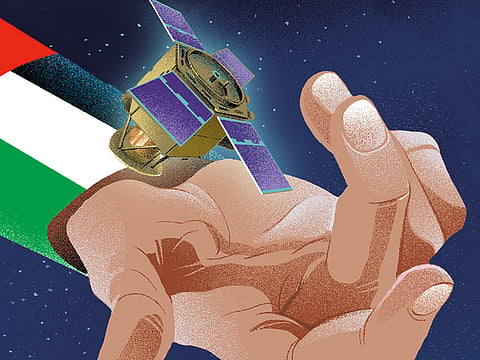How UAE made the leap to space
Investment in education has given us the scientists and engineers that developed KhalifaSat — the country’s first entirely home-built satellite

Anyone tuning into UAE news over the past week could not escape the mention of ‘KhalifaSat,’ the UAE’s very own home-grown satellite, which was successfully launched from Japan’s Tanegashima Space Centre on October 29.
But why all the fuss? After all, satellites get launched all the time. In fact, around 100 are sent into orbit each year. KhalifaSat isn’t even the first to bear the mark of the UAE, with eight of the country’s other spacecrafts built in conjunction with other agencies currently circling the globe.
The achievements of KhalifaSat, quite naturally and rightfully trumpeted by the media, focus on the fact that it is an advanced piece of technological hardware that is 100 per cent Emirati-made, with its concept, design and construction all completed by Emirati scientists and engineers. It was also the first satellite to be built in the clean rooms of the Mohammad Bin Rashid Space Centre, a facility designed to help the UAE take a lead in space science.
The congratulatory standpoint has been one of how the UAE is a contender for leading space technology, as if this was always the case.
It is so easy to forget that the UAE is competing with advanced nations who cut their teeth in the space sector before our country even existed. By 1975, the USA had put 12 men on the moon. It was also the year they launched their Voyager orbiter/lander to Mars and the year the Soviet Union launched a probe to Venus. In contrast that same year the UAE’s adult literacy was just 54 per cent among men and 31 per cent among women, with the population of the country standing at a little over half-a-million people.
Today, literacy rates for men and women in the UAE are in the nineties and growing at 21 per cent per year. Its population is 9.4 million and the country has established itself as a major player on the international stage.
The country’s higher education sector has been a part of this exponential growth and it is worth reflecting on this in the context of KhalifaSat. The launch of the satellite is not only a historic milestone for the nation’s nascent space industry, but also a major landmark for the leadership’s commitment to investing in education.
The arc of KhalifaSat story can be traced to the late Shaikh Zayed Bin Sultan Al Nahyan, founder father of the UAE, whose commitment to educating his people was paramount. “The greatest use that can be made of wealth is to invest it in creating generations of educated and trained people,” he said, and “The real asset of any advanced nation is its people, especially the educated ones, and the prosperity and success of the people are measured by the standard of their education.”
Shaikh Zayed’s desire to improve UAE citizen’s access to education, irrespective of their background, is something I have fond personal experience of. My father, like many men of his generation, took the traditional route as an adult and joined the army. He nevertheless had a passion for medicine and although a high school diploma was, at the time, sufficient to kickstart a career, he was adamant to pursue higher degrees. Empowered by the policies, vision and directives of Shaikh Zayed, my father was able to secure a scholarship and follow his dream. He honed his skills in medicine and went on to retire as a renowned and reputable physician.
I am a fervent believer in lifelong learning, and in the ability to pursue knowledge at whatever stage of life you may be at. In particular, a Science, Technology, Engineering and Mathematics (STEM) education is what is putting our satellites into space, and also leading our great nation to a sustainable future.
Three years ago this month, His Highness Shaikh Khalifa Bin Zayed Al Nahyan, President of the UAE, made a commitment to the STEM sphere by announcing the adoption of the Emirates Science, Technology and Innovation Higher Policy. Comprising 100 national initiatives that cover the sectors of education, health, energy, transportation, space and water, the ambitious plan incorporated new national policies designed to both lead to the creation of a dynamic knowledge economy in the UAE and to place the country firmly at the fore of global nations with advanced skills.
We are extremely proud as a nation to have launched our first fully Emirati satellite, which can be seen as an important stage on our journey, in the same way that a Saturn 5 booster rocket was an important stage in putting the first man on the moon.
KhalifaSat is a key milestone on the journey that will see the UAE launch the ambitious Emirates Mars Mission’s Hope Probe in 2020 — the region’s first interplanetary spacecraft and the first Arabic and Islamic mission to Mars. Beyond that, we can look to the UAE establishing the first city on Mars in the first half of the next century.
But the UAE does not want to go to space simply as an end in itself. Its goal is — and will always be — its people.
The country’s uncompromising commitment to research and development will always have human beings at its core. Focusing on people above all else is a commitment the UAE made at its inception; it is a strategy that has proven its merit time and time again.
Today, this investment has given the scientists and engineers that have developed the UAE’s first entirely home-built satellite, with those following in their footsteps set to take humanity to the stars.
Where we go from this point is limited only by our ambition and the determination of our people.
Ahmad Belhoul Al Falasi is the UAE Minister of State for Higher Education and Advanced Skills and Chairman of the UAE Space Agency.


